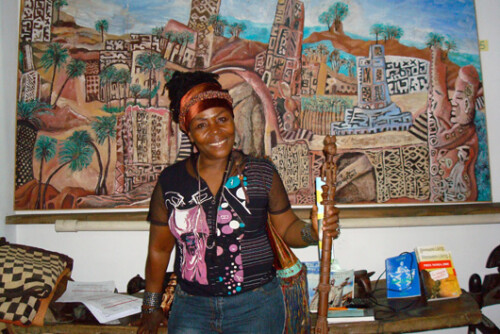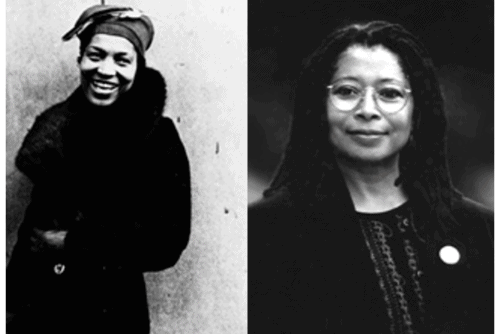Attempting to Make Sense of It All: Liminality
One of the best things that happened at the institute was the chance to interrogate, on a personal level, the validity of using “diaspora” and “women” as categories of analysis. I decided to explore the diverse experiences of African-American woman. I did this by designing a tableau about African-Americans in a magazine produced by the participants. Everyone else contributed written stories that related experiences in their home country to a topic discussed during the training institute, but I chose collage as a creative alternative.

At first glance, the collage is a tableau at the center of which is a quote from African-American artist Kara Walker: “MANY BLACK WOMEN LIVE IN THE UNITED STATES OF AMERICA. THEY LIVE THERE NOW STILL. MANY BLACK WOMEN VISIT OTHER COUNTRIES TO SHOW PEOPLE IN THOSE OTHER COUNTRIES HOW BLACK WOMEN SURVIVE.” 1 Close inspection of the collage reveals a border composed of statistics about black women in America, including the finding that thirty-five percent of African-American women between ages eighteen and twenty-four go to college and that African-American women make up sixty-six percent of all AIDS diagnoses in 2006. 2 My goal here was to highlight the inequalities—and diversity—of African-American women, with the statistics revealing the range of experiences inherent in this single group of people. I also wanted to use Walker’s quote and the statistics to hint at the overall history and experiences of African-American women.
Along with these goals, I wanted to discuss the relationship between African-American women and Africa. Beneath Walker’s powerful quote is a watermark of a slave ship. The barely detectable slave ship symbolizes the ever-present impact of history on our current reality. Although slavery has ended, many of the social-economic injustices in existence today have roots in slavery. Toward the bottom of the collage, I included the definitions for “diaspora” and “liminality,” the latter of which references the dual spaces occupied by U.S. women of African descent as both “African” and “American.” My goal with all of this was to initiate a discussion about the diversity among African-American women. Although African-American women belong to both categories (“diaspora” and “women”), some have access to higher education, and some do not; some receive adequate medical treatment, and some do not. In many ways, Walker’s quote about survival subverts the disempowered notions communicated by some of the statistics.
Sauti Yetu: Our Voices
I was not the only participant who recognized the limitations of the institute—and, by extension, many institutional activist endeavors. A group of us felt the need to exploit the opportunity of having been brought together to mobilize other activists. Informal discussions held during social time revealed that some fellow participants and I wanted to capitalize on our experience by arming ourselves with greater awareness and critiques of our experiences. Some of us decided to form an activist exchange network that focuses on connecting young women activists of African descent from around the world. We are committed to recognizing the diversities inherent in the experience of women within both Africa and the diaspora. Our aim is to sponsor an activist from the continent and another from somewhere in the diaspora on a six-month exchange program, during which they participate in activist efforts on the ground. We have tentatively chosen the name Sauti Yetu, meaning “Our Voice” in Swahili, to represent both the group itself and the individual communities comprising that group. 3
Our aim is to “engage young activists of African origin through an exchange program to increase their understanding of Africa and the diaspora and to stimulate them to find intercultural responses to the cultural, social, economic, and political challenges of Africa and the African diaspora.” Inherent in our mission statement is the recognition of the multiple diversities that exist both on the continent and within the diaspora. By capitalizing on this diversity, we hope to ensure that participants are continually critiquing constructions, such as diaspora. This exchange network relies on the idea that we must learn from each other.
Our intention is to subvert the disempowered assumptions often affixed to communities of African descent on the continent and throughout the diaspora. Kim Butler speaks about this very effort: “Traditionally, diasporas have been viewed as disempowered because they typically lack the resources (particularly economic and military) of formal states. It has therefore been easy to establish their disempowerment as normative. Nonetheless, transnational formulations are clearly capable of overpowering the national insofar as they are able to mobilize necessary resources . . .” (213). The disempowered narrative that Butler references is based on assumptions that the diaspora is connected through experiences of shared oppression. However, the entire aim of Sauti Yetu is to recognize that, despite global economic disparities and diverse experiences, we can all contribute to the amelioration of global society if we free ourselves from making false assumptions and commit to the process of learning and investigation.
To address issues of the homogenization of women, we hope to connect the participants with various community-based women’s rights organizations. They will meet empowered women contributing to the betterment of their own lives and to the health of their communities. The focus is on learning from rather than on saving the “disempowered.” It is worth mentioning that the concept of empowerment did not figure into our discussions because this term connotes a particular power dynamic, rather than a relationship based upon collaboration.
The Sauti Yetu board communicates via e-mail and arranges Skype conference calls to discuss the development of the initiative to date. These virtual conferences have to contend with the challenges of Internet access, time zone, and language differences—among us, we claim English, French, Portuguese, and Swahili as mother tongues, and we represent varying degrees of English proficiency. Our initiative represents an emerging movement of the twenty-first century described as “technology-enabled activism,” which, as the name suggests, uses technology as a tool for generating social justice.
A substantial amount of research has gone into documenting the development of technology, particularly that of mobile phones, for activist purposes on the African continent. Herman Wasserman of the Department of Journalism at South Africa’s University of Stellenbosch has argued that the Internet can establish links between similar groups around the world in an effort to build networks of solidarity: “Not only do these new media technologies facilitate formal political participation (so-called “e-governance”), but they also provide the means for social movements, activists groups, or minority groups to engage with these processes on a global level . . .” (4). Technology-based activism, as demonstrated by Sauti Yetu, continues to effectively connect people in a manner unimaginable even a decade ago. Still, large segments of the global population remain marginalized by lack of access to technology. Though this does not totally exclude them from working to improve the conditions of their communities, the further development of and accessibility to technology will extend a role to groups otherwise disconnected from each other. In the interim, it is the role of organizations like Sauti Yetu to be conscious of its relative privilege and to work toward giving marginalized groups a voice at the global level.
Perhaps the greatest testament to our aim to subvert the narrative of disempowerment is an examination of the people who make up the exchange network. Our members are often grouped in the category of “disempowered” by virtue of both our African origins and our gender. The very fact that we have put this organization in motion, however, disrupts any presumptions of our powerlessness and positions us as agents of change.
- This quote was displayed at The Whitney Museum (NYC) as part of the exhibition Kara Walker: My Complement, My Enemy, My Oppressor, My Love from October 11, 2007 to February 3, 2008.[↑]
- African Americans make up the single largest racial minority in the United States; thirty-five percent of African American women between eighteen and twenty-four years old are enrolled in college.; black women represented sixty-six percent of AIDS diagnoses in women in 2006, though just twelve to thirteen percent of American women are black; African-American women constitute roughly forty-five percent of single female-headed families in America.[↑]
- We have since discovered that an organization “Sauti Yetu” already exists in New York City (www.sautiyetu.org). Their motto, “Our Voice in Our Diversity for Dignity and Our Rights,” recognizes the diverse experiences of African women both on the continent and as immigrants in the United States. Our group is in the process of choosing another name.[↑]



